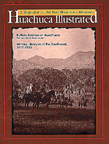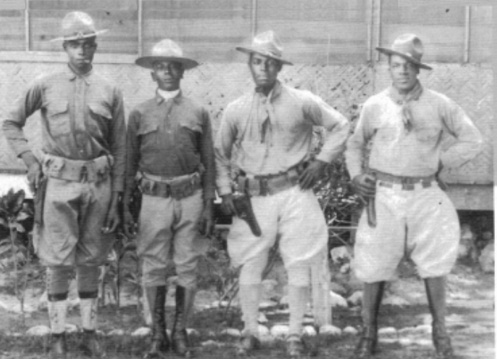 Huachuca
Illustrated, vol 1, 1993:
Huachuca
Illustrated, vol 1, 1993: Huachuca
Illustrated, vol 1, 1993:
Huachuca
Illustrated, vol 1, 1993:
chuca Illustrat
chuca Illustrat
Buffalo Soldiers at Huachuca:
Reductions in the Black Regiments
chuca Illustrat

Troop A, 10th Cavalry, commanded by Capt. Daniel Cullinare.
Photo courtesy Cdr. M. G. McKinney, USN Ret.
In 1926 Congress authorized the expansion of the Army Air Corps. This would mean that over the next five years other Army units would have to be reduced to provide the necessary manpower to fill up the bigger Air Corps and at the same time stay within the Congressionally mandated strength ceiling. The 10th Cavalry and the 25th Infantry in Arizona were called upon to take their share of cuts in 1931. This resulted in a relocation of the regiments and their dispersal to different stations. It also caused a freeze in enlistments and promotions within these two regiments.
The suspension of enlistments in black regiments was interpreted by the NAACP as a move to gradually abolish those regiments. Army Chief of Staff Gen. Douglas MacArthur responded to the deluge of inquiries by assuring the White House:
The War Department does not distinguish between its soldiers and treats white and black absolutely alike. Apparent effort is now being made to establish the principle that the Negro soldier shall receive preferential treatment over the white soldier. The War Department wishes emphatically again to go on record that it believes it would be most harmful to establish any differential treatment between soldiers of the American Army because of difference of race or color.
The NAACP was quick to agree in principle with MacArthur, but to point out:
It is our earnest desire that Negro and white soldiers receive the same treatment and the same consideration, with no preference for either white or black units.
It is the conception of this Association that non-preferential treatment for white and colored soldiers, if adhered to by the War Department, would result in the Tenth Cavalry being kept together at one post; in Negroes being enlisted in the Air Corps and every other service of the Army; in full armament equipment being distributed to Negro combat units, that is, trench mortars, howitzers, machine guns, etc.; in full staffs of colored noncommissioned officers in existing colored units; in free and unobstructed admission of Negro cadets to the United States Military Academy at West Point; and eventually in colored officers being promoted and assigned to commands on the basis of their ability and not their color.
MacArthur's deputy acknowledged that it "was a very good letter," but it went unanswered.
Another black leader appealing to President Hoover on behalf of the black regiments was the president of Tuskegee Institute, Robert T. Moton.
I would respectfully ask you to consider the long and honorable career of Negro troops in the service of the United States. It is the universal testimony that they are excellent soldiers and p6ssessed with eager willingness in the performance of their duties under all conditions of service. It is more than unfortunate, it is an injustice, that regiments that have distinguished themselves in the way the 10th Cavalry and the 25th Infantry have done, should be reduced from combat service to be menials to white regiments, without chance for training or promotion and be excluded from other branches of the services. It is merely a pretense that Negroes are accorded the same treatment in the United States Army as is given to white troops. It has never been the case and is not so now. This applies both to the rank and file, as witness the presence of the highest ranking Negro officer in the United States Army [Col. Benjamin 0. Davis] at Tuskegee Institute at the present time, who, by reason of his color is denied service according to his rank and with his own regiment.

Members of the 10th Cavalry pose for the camera. At
the left is Private Tom Prowl.
The impression that the black regiments were being systematically stripped away was not only given to the black community but was being felt within the Army itself. An article in The Cavalry Journal for September-October 1931 expressed the belief of the 10th Cavalry officers that their regiment was passing from the scene. Their orders to leave Fort Huachuca for various postings back east, at separate locations, inspired grave misgivings among the men of the 10th. The journal article said:
The passing of the 10th Cavalry as a combat regiment is an event of note and will come as a shock to many distinguished officers and soldiers who have served with it. The 10th Cavalry returns saber with a proud consciousness of duty well-done. The past will preserve for it a record second to none.
For the future we can confidently predict that it will carry on in its new role with the same loyalty and high spirit that has given its motto a living meaning, "Ready and Forward."
A 10th Cavalry veteran, John B. Brooks who as a second lieutenant served along the border in 1914, was displeased with the manner in which the 10th Cavalry was fragmented and given ornamental or menial missions.
... They broke up the 10th in a funny way. They sent the machine gun troop to Washington, where it became the escort troop and because they were so spit and polish, old soldiers and everything---all they did was escort a few VIPs we had in those days. Of course, they didn't come to Washington in droves like they do now. Then the first squadron was sent to West Point to look after the horses of the cadets there at the Military Academy. The second squadron went to Fort Leavenworth to look after all the horses for the equitation class at the Commanding General Staff School and the third squadron went over to.Fort Riley to do the same at the Cavalry School.
... It lost its identity as a real soldier outfit when they became nothing but a bunch of dog robbers. And it hurt them too; they didn't like it at all. The old soldiers, as soon as they could retire, instead of staying; they just retired.(51)
Despite all of the protests, the 10th and 25th would take their share of manpower cuts and be spread thinly. The Army has traditionally been hard-pressed to progress while staying within its authorized strength limits. As Maj. Gen. George Van Horn Moseley, Deputy Chief of Staff, put it in 1931: "In the adjustment of our military program, the fact is there is not enough Army to go around."(52)
Footnotes: